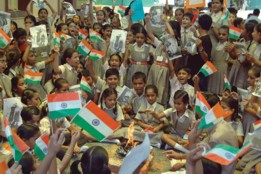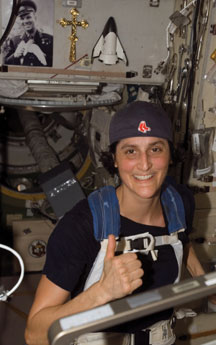Life
Is Sunita Williams Really An Indian Idol?

Are we so bereft of heroes that we have to import them at the cost of our self-esteem?
Trust our desi bhais and behenas to over-react.
The first whiff of perceived trouble on the return journey of the Space Shuttle Discovery last month, and India went into religious over-drive. Nothing apparently was seriously amiss aboard the International Space Station or in the team’s plans, save for the fact that the weather in Florida was deemed inclement for a space-ship landing. From a sane and rational perspective however, there was no room for alarm: adequate fuel supplies, viable alternative options and NASA’s backup systems on the ready. But reports of the weather conditions were enough to prompt frenzied prayers in temples, churches and mosques, and trigger off elaborate public yagnas and havans (sacrificial fires accompanied by mantras and incantations to propitiate various deities) in several Indian towns and cities. The media were doing their dutiful bit. Newspapers splashed detailed front-page reports, and dozens of reporters from television channels and radio stations were assigned to monitor the developments and convey minute-by-minute bulletins to a nail-chewing nation on the edge of its quivering seat. Would the crew members return safely?
To an extent, the anxiety seemed justified. After all, a similar space mission in 2003 was marred by tragedy. Spaceship Columbia had been blown to pieces minutes prior to re-entering the Earth’s atmosphere because of an undetected fault in its heat shield, killing the seven astronauts on board, including Kalpana Chawla. This time too, the concerns of a billion-plus Indians at home and abroad focused on an Indian – or, as the reports primly pointed out, “a person of Indian-origin” – called Sunita Williams among the crew members. In fact, it would be reasonably accurate to predict that if it were not for her “Indian” origins, the Discovery story would be hard put to find even a small corner-space of the front pages in Indian newspapers. Let’s not kid ourselves. Despite the general rise in education and literacy levels among media consumers, Indians are far from getting turned on by stories about rocket technology and space exploration. And Discovery was, at the end of the day, a fairly routine mission by NASA standards. We’re not talking here of a moon or Mars landing, are we? Then why this wide-eyed over-reaction to the story of this half-Indian woman who happens to step into an American spacecraft? Just because of her Indian-sounding first name? Just because her hand-baggage included a copy of the Bhagawad Gita, a miniature of Lord Ganesha, and some samosas? And merely on the basis of her father’s television sound byte that she sometimes listens to Indian classical music?
There is a section of Indians – admittedly miniscule as of now – that is vexed by these and similar questions. To be sure, they are not dismissive of the achievements of this remarkable woman. Who can take away from Sunita Williams the credit for the numerous records that she set in a single space mission? Who, but an ignorant and insensitive oaf, can fail to be impressed by a woman successfully pursuing a career in a tough and demanding field, with a combination of admirable grit and single-minded tenacity? Their quarrel is not with Sunita Williams as a person, but with those who have dubiously appropriated her personality as one of their own, who are forever on the look-out for links, however tenuous, with the next available international celebrity and therefore more than keen to convert every second story into nationalistic hype. And so the hype around the latest “Indian” idol, they believe, reveals less about Sunita herself than about Indians as a nation of insecure fawners. Their contention is simple: Sunita Williams was not born a thorough-bred Indian; she has not on her own acquired any abiding Indian connection either through her choice of residence, occupation or spouse. If at all, she is – in India and for Indians – a product of the Great Non-Resident Indian Publicity Machine. She has had a synthetic “Indian” identity thrust upon her by a celebrity-hungry horde of media reporters and by an over-zealous bunch of relatives back in India for a naïve, pliable and unsuspecting public’s consumption. A public that’s sadly incapable of looking beyond the West (read: US of A) for its cues. Let’s look at their objections point by point. First, some no-brainers. You don’t need to be an “Indian”- full, half or quarter – to be enchanted by an elephant-headed Hindu god, to be intrigued by Oriental mysticism and spirituality hreflected in scriptures and epics like the Mahabharata, or to be taken in by the deliciously aromatic and spicy flavours of our multi-faceted cuisine. All you need really is an open and curious mind, coupled preferably with a weakness for snake-charmer exotica, an adventurous palate and an intestinal lining that can withstand a spicy-hot attack. But does that in and by itself qualify you as a true Indian? If it did, a large portion of the white population in Great Britain and significant numbers of Americans – particularly young nubile girls on college campuses – could claim a legitimate affiliation to Indian-ness. For several decades, traditional Indian food with its local variants, going by the unexplained, but nevertheless accepted name of “balti” cuisine, has loosened the stiff upper lips as well as the purse-strings of even the more crusty and insular Britishers. And I know of several Americans who’d give much more than an arm and a leg to be treated to home-made curry served in the ambience of incense fumes and sitar strains. History is proof enough that India has held a perennial fascination for the foreigner. Among others, the Greeks, the Arabs, the Moghuls, and finally the Europeans (Englishmen to a greater extent than the Frenchmen and the Portuguese) have all left behind stories and traveler accounts, and – more significantly – their legacies as decipherable marks on its culture and civilization. At the risk of sounding chauvinistic, it is helpful in these days of so-called globalization to remember and realize that India has served as a cultural and ethnic melting pot of the world for as many millennia as America has for centuries. So it is only natural that India still attracts global attention and curiosity. But is a mere interest in things Indian a sufficient yardstick for acceptance? To get away from the surface trappings of a phony and spurious Indian-ness, we have to look more closely at Sunita Williams’ life-choices, her background and upbringing, and even her bio-data. Quite literally. She was born in Euclid, Ohio, to parents of disparate national and ethnic roots. While her father is a Gujarati Pandya, an India-born first-generation immigrant who decided to marry, settle down and raise a family in the United States, Sunita’s mother is of non-Indian (Slovenian) origin. Significant, if only because it’s a universally acknowledged truism that a mother tends to have a greater and deeper influence on the hearts and minds of her growing kids – particularly her daughters – than does their father, however dominant he may overtly show himself to be. How familiar with – or even interested in – Indian culture and lifestyle is or was Mrs. Bonnie Pandya during Sunita’s formative years? Worth asking. Equally relevant to this debate is the question of life-choices. Nobody need quibble that a kid born to an Indian father in faraway Ohio and raised in Needham, Mass., speaks no Indian language fluently and even speaks English with an accent that’s decidedly not Indian. Or, that the kid later took a serious academic and professional interest in a field that’s best pursued in the high-tech environs of her native country. That’s the inescapable cost and consequence of living abroad. Questions however do stem from what the kid decided to do in the more mature phases of her life. She chose, for instance, to enlist in the U.S. Navy at age 24 and risked her life for the country of her birth while in active combat duty in the Operation Desert Shield during the 1990-91 Gulf War. Sunita Williams also chose to marry a non-Indian. A choice that is entirely personal and to which she is legitimately entitled, and that is now accepted in all but the most conservative of Indian families. But individual acceptance does not wipe away a fact of life: that marriage is as much a social contract as it is a personal commitment. When you marry, you don’t just marry a person; you also marry willy-nilly into his or her entire world. And that world is the universe of his or her family, friends and – above all – culture. Sunita’s choice of life-mate thus could arguably be a pointer to the kind of places and the kind of people she truly intends to spend her quality years. Good for her. But where does India figure in this column? Quite simply, it doesn’t. Talking of places veers us to the question of Sunita’s physical interaction with India. She is said to have visited the country no more than three times during the last forty-plus years. Not a shining statistic for anyone claiming close ties with it, but a statistic that nonetheless camouflages the reach of mass media in opening windows to geographically distant cultures. One such window for Williams was Kalpana Chawla herself. An acknowledged role-model and her predecessor in the NASA program, Chawla continues to be a household name in India. Odious comparisons have been made of their upbringings: Karnal-born Kalpana’s uphill struggles in small-town India and later as a foreign student in Arlington, Texas and Colorado contrasted with the clear advantages of growing up as an affluent doctor’s daughter in upper-class America. For those who question Sunita Williams’ status as an “Indian” icon, Kalpana Chawla and the other home-grown Indian space hero Rakesh Sharma are the only two Indian heroes in the annals of space exploration. The outcome of this debate may well hinge on your answer to a question that lies at its crux. Who, in your opinion, is taking a narrow ultra-nationalistic stand? Those who believe we should be willing to loosen our definition of “Indian” to accommodate an internationally recognized celebrity and achiever, because it adds to our national self-esteem? Or those who assert that while true achievement transcends nationality, such a slackening constitutes an insult to the very concept of an “Indian” nation and identity, because it implies we are so bereft of heroes that we have to import them at the cost of that same self-esteem. Take your pick. |



